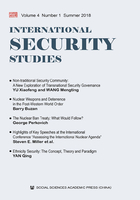
Non-traditional Security Community: A New Exploration of Transnational Security Governance
Abstract: With the emergence of numerous complex non-traditional security issues, the “resource-induced” security dilemma characterized by being non-military has become increasingly prominent. It is exerting an impact on the existent security policies and cooperation mechanisms of various governments and transnational organizations too great for the traditional security community to cope with these new challenges. Reflecting on the theories of the security community, this paper proposes the idea of“non-traditional security community” by defining its features, types, dynamics, and construction paths. It then expands the theories of multilateral security cooperation. The non-traditional security community places emphasis on the shared future of nations when confronted with threats, advocating that union and sharing based on “generic security”is an effective solution to the “resource-induced” security dilemma. With “optimum coexistence”, “shared security”, and “security co-governance” as its core categories, “peacecooperativism” is the value premise for the non-traditional security community and the“multidimensional-multilateral cooperation” is the best way to build the non-traditional security community. Meanwhile, China should actively participate in the construction of the non-traditional security community at sub-regional, regional, and global levels with a view to implementing the idea of “community of shared future”.
Keywords: resource-induced security dilemma, non-traditional security community, multidimensional-multilateral cooperation, security governance
Introduction
Community is a mode of human existence and development as well as an important mark that man carries out practical activities as a social being. As a theoretical subject, scholars in the fields of philosophy, political science, sociology, etc. pay great attention to “community” and conduct in-depth and extensive research on it. Writings on community by academicians of international relations are more focused on “security community”. “In terms of political philosophy, security study with state centralism as its driving force and undoubted priority has gradually become complex and societyoriented to deal with an increasing number of individuals and small units, and many non-state actors at various levels. In constructivist terms, security study is pushing forward its reorientation towards society.”
“In terms of political philosophy, security study with state centralism as its driving force and undoubted priority has gradually become complex and societyoriented to deal with an increasing number of individuals and small units, and many non-state actors at various levels. In constructivist terms, security study is pushing forward its reorientation towards society.” In recent years, with the emergence of nontraditional security study, scholars have also accorded attention and consideration to security community under the context of non-traditional security.
In recent years, with the emergence of nontraditional security study, scholars have also accorded attention and consideration to security community under the context of non-traditional security.
Scholars of international relations construct “security community” to resolve“military” security dilemmas while a large number of prominent non-traditional security problems in the wake of the Cold War have brought about a kind of “resourced-induced”security dilemma that is different from traditional security dilemmas. The traditional security community dominated by state governments is inadequate to address nontraditional security threats. Therefore, the theory and practice of non-traditional security requires researchers to put forward a “non-traditional” formula corresponding to the new security situation. The construction of “the non-traditional security community” is an effective path for humankind to cope with non-traditional security threats.